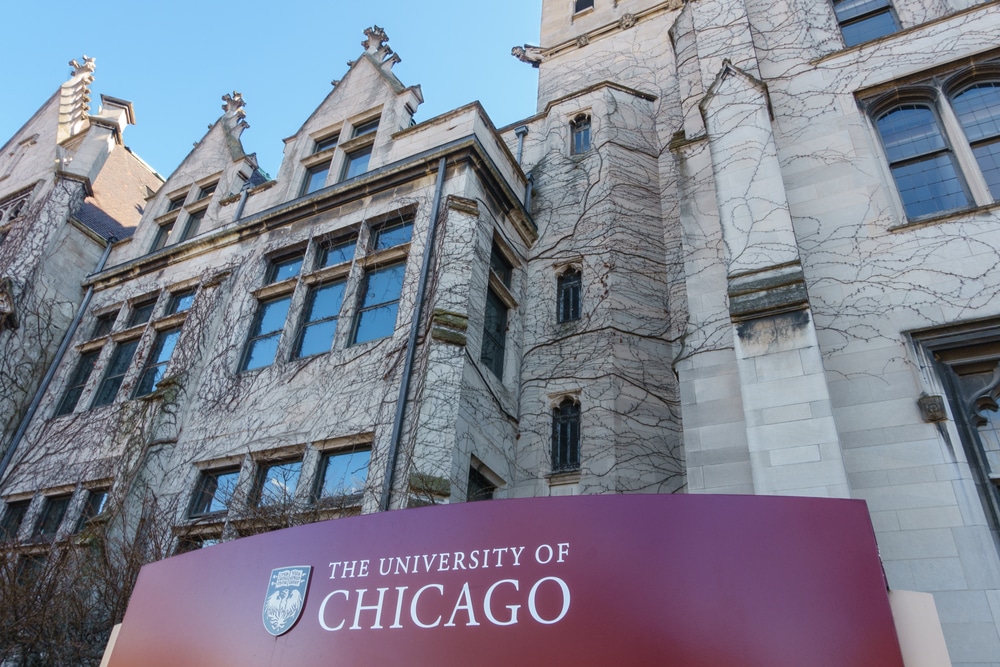UChicago Early Action, Early Decision, and Regular Decision Notification Dates Class of 2028
UChicago’s early action, early decision, and regular decision notification dates for the Class of 2028 are crucial steps for applicants. As a future member of the Class of 2028, understanding these timelines can profoundly impact your application strategy.
This blog post will guide you through each notification period, helping you plan your approach to one of the most significant milestones in your academic journey. Stay tuned for key insights and prepare to mark your calendar with these important dates. Remember, staying informed is your first step toward a successful application season.
UChicago Early Action and Early Decision Notification Dates Class of 2028
The University of Chicago (UChicago) is renowned for its challenging academics and esteemed faculty. Earning a spot is a significant achievement for many driven students. For a smooth admissions process, you need to know UChicago’s early action and early decision notification dates for the Class of 2028, which are quite specific.
When Does UChicago Early Action Come Out?
UChicago takes pride in early planning, releasing early action (EA) decisions in mid-December. Unlike some schools that offer Single-Choice Early Action (SCEA) or Restrictive Early Action (REA), which limit you to applying early to one institution, UChicago allows you the freedom to apply to multiple schools under non-restrictive EA plans. This approach lets you consider various offers and choose the best one for your educational and financial needs.
When Does UChicago Early Decision I Come Out?
If UChicago is your top choice, consider the Early Decision I (ED I) program, a binding commitment. UChicago announces ED I decisions in mid-December, the same time as EA notifications. By choosing ED I, you show the admissions committee your strong interest in UChicago, which could impact your admission chances. However, you must still meet UChicago’s high standards, including showing intellectual curiosity, academic strength, and potential to contribute to the community.
When Does UChicago Early Decision II Come Out?
UChicago offers a second chance with Early Decision II (ED II), another binding option, for students who decide UChicago is their top choice after the initial application rounds. You will receive ED II decisions in mid-February. This gives you another opportunity if your first-choice preference evolves after the early rounds.
What Time Does UChicago Early Action and Early Decision Come Out?
The exact times for early action and early decision notifications may vary, but UChicago typically sends them during the day, Central Time. You should check your email and UChicago’s applicant portal throughout the decision day. UChicago might issue notifications in batches to maintain server stability and ensure smooth information delivery.
As decision day approaches, your anticipation grows. This period is a time of reflection on the work you’ve done and what these upcoming decisions mean for your future. Soon, a new chapter will begin for the Class of 2028, and your journey toward higher education will take a significant step forward.
UChicago Regular Decision Notification Date Class of 2028
Understanding college admissions timelines can often feel like a maze of dates and deadlines, with each university crafting its own unique schedule. Yet, UChicago distinguishes itself through its academic prowess and its transparent approach to sharing vital admissions information, including the much-anticipated regular decision notification dates for the Class of 2028.
When Does UChicago Regular Decision Come Out?
UChicago’s regular decision process gives you the most time to submit your application, culminating in late March when the university announces its admissions decisions. This timeline allows you to take extra care in ensuring your application reflects your academic strengths and diverse interests fully.
Grasping the regular decision timeline is vital—it influences how you prepare and complete your application and can shape your strategy for applying to other colleges. At UChicago, the highly competitive nature of admissions means that you might spend the additional time afforded by the regular decision process to better align your qualifications with the university’s expectations and values.
This prolonged period benefits you twofold: the admissions committee can review your application thoroughly, and you get the chance to boost your standardized test scores, improve your senior year grades, and refine your essays and other application elements. UChicago seeks to enroll students who will excel academically and contribute meaningfully to the campus community.
What Time Does the UChicago Regular Decision Come Out?
The specific time when UChicago releases its regular decision notifications varies, but traditionally, decisions are posted in the late afternoon. This scheduling considers international applicants across different time zones and ensures that guidance counselors and admissions consultants are available to assist you with the next steps.
On decision day, manage your expectations. High traffic can slow down university servers, possibly causing delays when you try to access the decision portal. To avoid any last-minute issues, make sure you can log into the applicant portal well before the notification day.
The release date for Regular Decision is pivotal for UChicago applicants, marking the end of a long journey and the start of a new adventure for those admitted. It’s wise to find a peaceful place where you can comfortably process your results. If the decision is not in your favor, it’s crucial to have alternative plans, such as considering other colleges or exploring gap-year opportunities.
Analyzing Patterns in Decision Release Times
While UChicago does not set a specific time for releasing decisions, they typically issue them in the afternoon or early evening, aiming to avoid disrupting your school day. You might be tempted to constantly refresh your email or application portal, but try to be patient. High traffic often causes system delays, so logging in repeatedly might worsen any server issues.
Emotionally preparing for decision day is crucial. Be ready for acceptance, a spot on the waitlist, or denial. Each outcome will require different actions and trigger different emotions. Celebrate if you’re accepted, but then start planning for finances, housing, and enrollment. If you’re waitlisted, devise a plan to demonstrate continued interest, but also consider other colleges. If you’re denied, remember that other opportunities will come your way.
Choose a comfortable and supportive environment when making your decision. Whether you prefer to be with family and friends or alone, ensure the setting fits your personality. It can greatly affect how you handle the news.
UChicago’s admission notifications mark an important moment, but they’re just one step in your educational journey. By familiarizing yourself with the process, recognizing past trends, and preparing emotionally, you can face decision day with confidence, ready for the next chapter in your academic career.
How Does UChicago Notify Acceptance?
For the notification date release of early action, early decision, and regular decision, the Class of 2028 often expects instant access to information, and UChicago meets this expectation in its admissions process. As you navigate the final stages of your college application journey, understanding how UChicago will notify you of their decision can give you a sense of control and readiness.
The Applicant Portal: Your Go-To for Admission Updates
UChicago’s applicant portal stands at the center of its notification process. This personalized online platform is your main source for all admissions updates. After submitting your application, you’ll receive credentials to log in to this portal.
Here, you can check the status of your application materials, get important announcements, and, most importantly, find out your admission decision. UChicago updates the portal regularly to provide the most current information just for you.
This portal is user-friendly and transparent. As the decision day draws closer, keep an eye on your portal for any new information. Universities often release decisions at different times, and UChicago’s system allows you to see your results as soon as they’re ready, without any need for comparison.
Email Communication: Your Direct Connection
Emails serve as a direct connection between UChicago and you. The university will send timely emails, which may remind you to check the portal or announce when decisions will be available. Ensure you give UChicago an email address you check often so that you don’t miss anything important.
UChicago may also use email to ask for additional information or clarify something about your application, adding a personal touch to their communication. They value your unique story and the individuality of your application.
Ensuring Your Privacy and Security
UChicago prioritizes the security and privacy of your personal information. The applicant portal and all email communications are secured with the latest encryption technology. You can trust that your details and admission status are safe from unauthorized eyes. With the risk of data breaches today, the university’s commitment to cybersecurity is critical and provides peace of mind for you and your family.
The Role of Technology in Decision Notifications
UChicago doesn’t just use technology to notify you of their decision. The admissions office also employs advanced software to review applications, allowing a comprehensive and fair assessment of each applicant. By considering all parts of your application together, they uphold the integrity of the admissions process.
Preparing for Decision Day
As decision day approaches, UChicago will give you specific information about when they will release decisions via the portal or email. This clear communication helps set your expectations and allows you to prepare both emotionally and practically. Have a plan for decision day, like a quiet place to see your decision and people you trust to be there with you, no matter the result.
By updating its notification process and embracing digital solutions, UChicago meets expectations for prompt and secure communication. This approach also demonstrates the university’s commitment to a user-friendly and respectful application experience, mirroring its broader dedication to innovation and care within its community.
Exploring the Emotional Impact of Admission Notifications
As you move through the intricate process of college admissions, the approach of early action, early decision, and regular decision notification dates for UChicago’s Class of 2028 can stir a whirlwind of emotions. The period before the University of Chicago releases its admission notifications is particularly intense, filled with high expectations and anxiety. As you wait for these results, which will reflect years of hard work and dedication, understanding and managing your emotions becomes crucial for maintaining well-being.
Recognizing the Weight of Expectations
Applying to a prestigious institution like the University of Chicago often marks the pinnacle of your high school career. The pressure from personal and external expectations can magnify the stress associated with the admissions process. You should acknowledge this pressure but also remember that college acceptances do not solely define your self-worth. Encourage yourself to value the complete high school journey and all its accomplishments, not just the outcome of your college application.
Maintaining Emotional Equilibrium
Keeping your emotions balanced during this period is as essential as any academic preparation. Simple techniques like deep breathing exercises, engaging in physical activities, or pursuing hobbies can provide necessary breaks from the tension of waiting. It’s also beneficial to have a support system—family, friends, or school counselors—with whom you can discuss your anxieties and expectations. By fostering understanding and empathy, you can alleviate some of the emotional burdens you might feel.
Coping with the Outcome
When you receive your notification, you will likely experience a range of emotions. For those who get positive news, it’s a moment of joy and celebration. Remember to be considerate of peers who may not have received the news they hoped for. If you face disappointment, it’s important to process these emotions but also to see the opportunity for growth and resilience. A rejection from a college does not measure your abilities or future success potential; it’s simply a different direction, not a closure of opportunity.
Planning for Multiple Scenarios
You are encouraged to prepare for multiple scenarios before decision day. This means setting realistic expectations, considering various outcomes, and preparing for each. If accepted, what are the next steps? If the decision is deferred or denied, what alternatives can you pursue? Having a plan in place can help you feel more in control and less at the mercy of uncertainty.
Embracing Mindfulness and Positive Visualization
Mindfulness and positive visualization can be effective for managing stress. Mindfulness keeps you focused on the present and promotes self-compassion, helping you avoid excessive worry about potential outcomes. Visualization lets you imagine a positive path forward, building confidence and peace, regardless of the admissions decision.
Seeking Professional Support if Necessary
If the anxiety surrounding college admissions becomes overwhelming, consider seeking professional support from a counselor or therapist. They can offer strategies to manage stress and provide a safe space to navigate complex emotions.
As you await your admission notification from UChicago, arming yourself with tools to manage the emotional impact is vital. Preparing emotionally as well as academically ensures that you are ready for any outcome, transforming a potentially stressful experience into an opportunity for personal growth and learning. The anticipation of admissions decisions is a significant milestone, and with the right mindset and strategies, you can emerge more resilient and self-aware, ready to embrace your academic future.
Strategic Planning for Early Action, Early Decision, and Regular Decision Applicants
Understanding early action, early decision, and regular decision applications resembles playing chess; each move is crucial and requires anticipation. As a prospective college student, you need to approach this with foresight, considering your preferences and readiness. Senior year brims with deadlines and decisions, so you must thoughtfully weave the college application process into this bustling time. Assess your academic standing, the strength of your application, and how sure you are about your college choice.
Evaluating Your Application Strength Early on
First, assess your academic and extracurricular profiles. If you are aiming for early action (EA) or early decision (ED), you need a solid application by November of your senior year. If you think your test scores could improve or you want to enhance your volunteer work or GPA, consider the regular decision (RD) route instead.
Also, your intended major’s competitiveness might sway your decision. Highly sought-after programs could see an ED application as a sign of commitment, while a more open academic path may suit the flexibility of EA or RD better.
Understanding the Binding Nature of Early Decision
Choosing an early decision means committing to one school if they accept you, which is something you must take seriously. This commitment restricts your ability to compare financial aid offers from other institutions. You and your family should discuss financial situations before committing to an ED application to ensure it’s a viable option for you.
Pros and Cons of Early Action
Early action provides an early response without a binding agreement. You can apply to multiple EA schools unless they offer single-choice early action or restrictive early action plans. This allows you to compare offers. However, don’t let EA make you complacent; prepare other applications as well, in case you don’t receive favorable news.
Regular Decision: A Time to Reflect and Choose
The regular decision offers the widest lens. It gives you more time to refine your application and allows you to compare offers and financial aid packages from different schools. This option is beneficial if you’re still undecided about your college preferences or if you believe your application will benefit from senior-year grades.
Strategizing Around Early Decision II
Consider Early Decision II if you’re not ready to commit to the first ED round or if your first-choice ED school doesn’t accept you. ED II, typically with a January deadline, still represents a binding commitment but gives you extra time to bolster your application and show continued interest.
Your decision to apply through early action, early decision, or regular decision should come after carefully weighing your college goals, academic history, and personal circumstances. Each route has its own advantages and limitations, which you must balance against your readiness and certainty about your college selection. Strategic planning can enhance your college application journey and improve your prospects in the eyes of admissions committees.
Maximizing Your Chances for Next Year’s Application
In anticipation of future admission cycles, it is crucial to grasp the intricacies of the competitive college admissions environment. This holds particular significance at the University of Chicago, a prestigious institution where admissions officers evaluate the entirety of an applicant’s profile. With the knowledge of the University of Chicago’s Early Action, Early Decision, and Regular Decision notification dates for the Class of 2028, it becomes increasingly important to focus on fortifying your application.
This aims to guide you in presenting a comprehensive and persuasive portrayal of your unique strengths to the admissions committee. We will explore various facets integral to a strong application, including academic rigor, extracurricular involvement, crafting impactful personal essays, preparing for standardized tests, engaging in meaningful summer experiences, and securing insightful teacher recommendations.
Academic Rigor: The Foundation of Your Application
At UChicago, academic excellence is paramount. You need to do more than just maintain a high GPA. Admissions officers look for students who stretch their limits academically. If your school offers Advanced Placement (AP) or International Baccalaureate (IB) courses, take them. But remember, it’s not enough to take these courses—you must excel in them to show your intellectual drive.
In addition to your classes, consider independent learning projects, research opportunities, and participating in academic competitions. For example, involvement in math or science Olympiads, writing for academic publications, or pursuing creative academic projects can all boost your academic profile.
Extracurricular Depth: Focusing on Impact
UChicago, among other colleges, values depth over breadth in extracurricular activities. Leadership roles, long-term involvement, and significant achievements within a few areas are more impressive than a long list of casual commitments.
Reflect on your passions and seek activities that align with them. Initiating a community project, excelling in a sport, or dedicating time to the arts are all ways you can demonstrate commitment and leadership.
The Personal Essay: Showcasing Your Unique Story
Your personal essay gives you a direct line to the admissions committee. Use it to convey your unique perspective and experiences. The most effective essays come from a place of introspection and authenticity, so focus on moments that have significantly influenced your worldview or academic interests.
Share stories of overcoming challenges, exploring intellectual passions, or pivotal personal growth experiences. The objective is to illustrate who you are through your experiences and dreams.
The Role of Standardized Tests
While the trend is moving towards test-optional policies, many students still include standardized test scores in their applications. If you’re among them, start preparing early. Create a study plan, take advantage of test prep resources, and consider multiple exam sittings to achieve your best score.
Summer Experiences: Broadening Your Perspective
Summer breaks are golden opportunities to engage in activities that enhance your application. Whether it’s attending academic programs, internships, or volunteer work, how you spend your summers shows your dedication to your interests and personal development.
The Importance of Teacher Recommendations
Recommendation letters should reflect strong, genuine relationships with your teachers. Nurture these connections throughout your high school years. When the time comes, choose teachers who can discuss your strengths in a personal and detailed manner.
By strategically approaching each element of your application, you set yourself up for the best chance of success. Remember, preparing for college applications is a marathon, not a sprint. Start early, stay organized, and when the time comes to apply to UChicago or any other leading institution, you’ll be ready.
Conclusion
As we approach the notification dates for the University of Chicago’s Class of 2028, students are encouraged to remain informed and prepared for all possible outcomes. The culmination of the application process is a defining moment, one that can set the course for a student’s academic future. By staying aware of UChicago’s notification dates and understanding the implications of each admissions option, applicants can navigate this period with confidence and clarity.











































